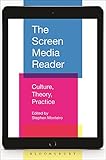The screen media reader : culture, theory, practice / edited by Stephen Monteiro.
Contributor(s): Monteiro, Stephen [editor of compilation.]
Publisher: New York : Bloomsbury Academic, 2017Description: xxi, 466 pages ; 25 cmContent type: text Media type: unmediated Carrier type: volumeISBN: 9781501311697 (hardback); 9781501311703 (paperback)Subject(s): Mass media and history | Mass media -- Technological innovations -- Social aspectsDDC classification: 302.23 LOC classification: P96.H55 | S37 2017| Item type | Current location | Home library | Call number | Status | Date due | Barcode | Item holds |
|---|---|---|---|---|---|---|---|
 BOOK
BOOK
|
COLLEGE LIBRARY | COLLEGE LIBRARY SUBJECT REFERENCE | 302.23 Scr22 2017 (Browse shelf) | Available | CITU-CL-49770 |
Includes bibliographical references and index.
Table of contents
Preface
Acknowledgements
Permissions
Editor's Note
Introduction: Reflecting on the Screen
Section One: Screens and Their Histories
Introduction to Section One
1.1 Screen Identities
Charles R. Acland (Concordia University, Canada), “The Crack in the Electric Window”
Francesco Casetti (Yale University, USA), “What Is a Screen Nowadays?”
Sean Cubitt (Goldsmiths, University of London, UK), “Current Screens”
Anne Friedberg (University of Southern California, USA), “The Multiple”
William Henry Fox Talbot (Inventor of the calotype process, UK), “The Magic Mirror”
1.2 Evolution and Revolution
Plato, from The Republic
Erkki Huhtamo (UCLA, USA), “Screenology; or, Media Archaeology of the Screen”
Lev Manovich (CUNY, USA), “A Screen's Genealogy”
Edmond Couchot (Digital Artist and Art Theoretician, France), “The Ordered Mosaic, or The Screen Overtaken by Computation”
Uta Caspary (Art Historian/Architecture Critic, Germany), “Digital Media as Ornament in Contemporary Architecture Facades: Its Historical Dimension”
Section Two: Images and Frames
Introduction to Section Two
2.1 The Production of Images
Louis-Jacques-Mandé Daguerre ('Father of Photography', France), “Description of the Process of Painting and Lighting in...Pictures of the Diorama”
Lara Baladi (MIT, USA), “When Seeing is Belonging: The Photography of Tahrir”
Ron Burnett (Emily Carr University of Art + Design, Canada), “Building New Worlds”
Brad Chisholm (St. Cloud University, USA), “On-Screen Screens”
Sarah Atkinson (King's College London, UK), “Mobile Cinema”
Marcel Proust, from Swann's Way
2.2 Terms of Display
Giambattista della Porta, from Natural Magick: in XX Bookes
Frederick Kiesler (Architect, Ukraine), Building a Cinema Theatre
Jean-Louis Baudry, “Ideological Effects of the Basic Cinematographic Apparatus”
Harper Cossar (Emory College, USA), “The Shape of New Media: Screen Space, Aspect Ratios, and Digitextuality”
Stephen Monteiro (The American University in Paris, France), “Fit to Frame: Image and Edge in Contemporary Interfaces”
Mitchell Whitelaw (University of Canberra, Australia), “After the Screen: Array Aesthetics and Transmateriality”
Section Three: Environments and Interactions
Introduction to Section Three
3.1 Moments of Interface
O. Winter, “The Cinematograph”
Paul Frosh (The Hebrew University of Jerusalem, Israel), “The Face of Television”
Douglas Engelbart, from Augmenting Human Intellect: A Conceptual Framework
Heidi Rae Cooley (University of South Carolina, USA), “It's all about the Fit: The Hand, the Mobile Screenic Device and Tactile Vision”
Alexandra Schneider (Johannes Gutenberg-Universität Mainz, Germany), “The iPhone as an Object of Knowledge”
Virginie Sonet (Université Paris II - Panthéon-Assas, France), “The Smartphone Screen in All Its States”
Amy Herzog (Queens College, CUNY, USA), “In the Flesh: Space and Embodiment in the Pornographic Peep Show Arcade”
3.2 Systems and Networks
Haidee Wasson (Concordia University, Canada), “The Other Small Screen: Moving Images at New York's World Fair, 1939”
Anna McCarthy (New York University, USA), “From Screen to Site: Television's Material Culture, and Its Place”
Onookome Okome (University of Alberta, Canada), “Nollywood: Spectatorship, Audience and the Sites of Consumption”
Stan VanDerBeek (Experimental Filmmaker, USA), “'Culture: Intercom' and Expanded Cinema: A Proposal and Manifesto”
Robert Edgar, “The Aesthetics of the Arena: Live and Recorded”
Nanna Verhoeff (Utrecht University, The Netherlands), “Performative Cartography”
Further Reading
List of Contributors
As mobile communication, social media, wireless networks, and flexible user interfaces become prominent topics in the study of media and culture, the screen emerges as a critical research area. This reader brings together insightful and influential texts from a variety of sources-theorists, researchers, critics, inventors, and artists-that explore the screen as a fundamental element not only in popular culture but also in our very understanding of society and the world.
The Screen Media Reader is a foundational resource for studying the screen and its cultural impact. Through key contemporary and historical texts addressing the screen's development and role in communications and the social sphere, it considers how the screen functions as an idea, an object, and an everyday experience. Reflecting a number of descriptive and analytical approaches, these essays illustrate the astonishing range and depth of the screen's introduction and application in multiple media configurations and contexts. Together they demonstrate the long-standing influence of the screen as a cultural concept and communication tool that extends well beyond contemporary debates over screen saturation and addiction.

There are no comments for this item.